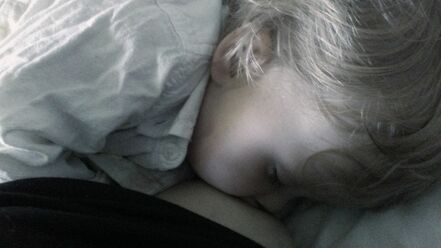|
How to address baby biting while nursing is a question that comes up regularly in my lactation support circles. Of course, it makes sense that this is a common question, because: one, all babies get teeth eventually; two, many babies like to experiment with these new things in their mouth while they're at the chest; and three, getting bit on the nipple really freaking hurts and once it happens once, a parent usually feels pretty desperate to make sure it never happens again.
The common suggestion I hear again and again, especially from peer parents in in-person and online peer support groups, is to address baby biting by taking corrective action; perhaps you could even call it punitive. Common advice I hear is "plug or cover baby's nose so she has to unlatch," and "firmly say "NO BITING!" and put your baby down on the floor and walk away quickly. I understand the rationale behind these suggestions: parents assume that, if a baby associates a negative consequence with biting, then baby will not bite. Well, it really doesn't quite work that way, and I cringe when I hear this advice being given. Here's the problem with a punitive response: it's really harsh, and it's gonna freak your baby out. I have seen such responses turn into full-fledged nursing strikes, meaning baby suddenly began refusing to feed at the chest altogether. A nursing strike isn't pleasant for anyone, and is usually a very stressful situation, especially for an exclusively breastfed baby. Nursing strikes often come as a result of a trauma in baby's world, and when that trauma happens while baby is nursing, it doesn't set baby up for a good future relationship with the chest. The punitive response also does not address the cause of the biting. Babies bite for two reasons: to relieve pain from teething, or because they're bored and want attention from their nursing parent. There are fairly obvious solutions to biting caused by teething pain: relieve the baby's pain before nursing by providing a cold toy to chew on, or frozen fruit or veggies, or rubbing a bit of ice on the gums. Biting for attention deserves more of a critical thought process to solve. Parents who follow gentle parenting theories, like those preached by William Sears, believe that a child's requests and needs (even those that are displayed with less than ideal behaviors like tantrums or biting) are valid and that responding empathically to and meeting those needs is the parent's duty, and will result in trust between parent and child and building of the child's self-esteem. So, to return to the punitive or harsh response to biting- yelling "no", setting baby down, walking away from baby- let's assess how those actions will affect trust and self-esteem according to attachment parenting models. They don't respond with empathy or consider the emotional need behind the baby's action; they don't validate the child's need or build trust between parent and child. They are the lactation world's equivalent of a time-out. So, once you've determined that your baby's biting is a way of saying, "hey, look at me, I'm down here! Play with me! I'm bored and lonely!" how do you address it? Give your baby some eye contact. Talk to your baby and play with his toes. Put your phone or book down. I get it, I do. I am an enormous multi-tasker when it comes to breastfeeding. It's truly when I get my reading, socializing, and just about everything else done. And while I am a fan of the idea that "breastfeeding meets all of baby's needs", there will come a time when your baby (just like you!) will be interested in a little more socialization during those nursing sessions. Avoid the temptation of your gadgets and duties once in a while and indulge in an intimate, fun,
0 Comments
|
AuthorI believe in the importance of knowledgeable, supportive professionals and peers to make natural infant feeding a success. Archives
March 2019
Categories |

 RSS Feed
RSS Feed
